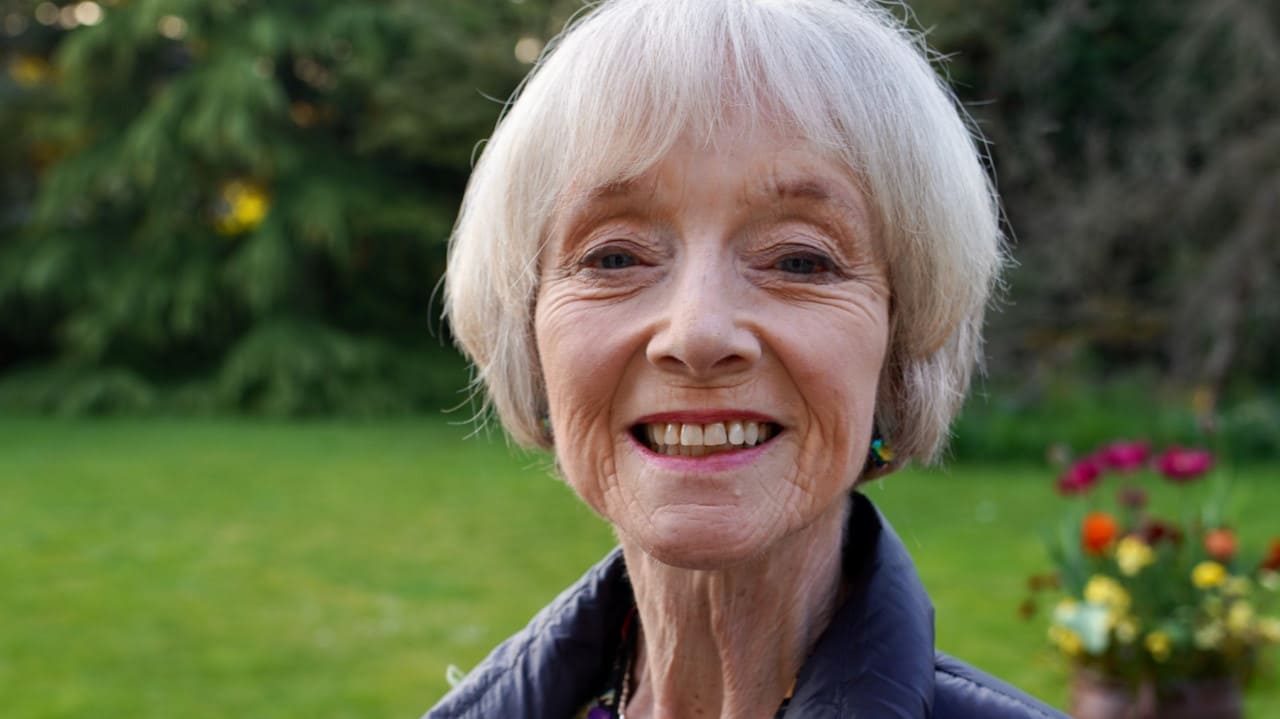You are viewing your 1 free article this month. Login to read more articles.
Celebrating the life of Felicity Bryan
A celebration of the remarkable life of Felicity Bryan, who died on 21 June 2020
On 25th October, as the mild autumn dusk set in over London, St John’s Smith Square opened its doors to the many authors, friends and publishing colleagues who had come to celebrate the remarkable life of Felicity Bryan, who died on 21 June 2020. Many others were watching online from around the world.
Inside, the beautiful, soaring space began to fill with the murmur of people, all in masks, seeing one another for the first time in many months, sometimes years. And on a screen in front of us was a huge black and white photograph of Felicity, looking radiant, smiling and with her arms raised as if to greet us. On each of the hundreds of chairs was an order of service, filled with more photos of her, from her early childhood in Yorkshire in the late 1940s, clutching a pet rabbit and a kitten, to her final week in June last year, in the garden she created at the Old Rectory in Kidlington, near Oxford, her family home since the 1980s. She was beautiful, and her style changed with each era, but her broad smile remained the same, always hovering on the edge of her characteristic giggle, or a burst of laughter, her eyes full of frank intelligence.
It was a service she had planned with Alex Duncan, her husband, in the weeks before she died, selecting speakers to reflect the different phases of her very full life. Her oldest friend, Patricia Lankester, described her first meeting with Felicity, fresh from finishing school in Paris, at an A-level crammer outside Cambridge, draped in a gorgeous cloak, a party girl from the outset. And how, after their art history degrees at London University, she rang Felicity from America to tip her off about a job at the Financial Times in Washington, DC.
 So began Felicity’s first career as a journalist, her long love affair with the US in the tumultuous late 1960s and early ’70s, and her relationship with Larry Stern, star correspondent at the Washington Post. Years later, back in London, after he died, she helped found the Stern Fellowship for promising young British journalists, who would spend three months at the Washington Post. Many household names got their big first break with the scheme. It has now been renamed the Stern-Bryan Fellowship, in her honour.
So began Felicity’s first career as a journalist, her long love affair with the US in the tumultuous late 1960s and early ’70s, and her relationship with Larry Stern, star correspondent at the Washington Post. Years later, back in London, after he died, she helped found the Stern Fellowship for promising young British journalists, who would spend three months at the Washington Post. Many household names got their big first break with the scheme. It has now been renamed the Stern-Bryan Fellowship, in her honour.
Other recollections of Felicity followed: by her New York friend Nina Darnton, read for her by Peter Osnos, founder of the US publisher Public Affairs; by her longstanding author Karen Armstrong; by Andrew Nurnberg, who took on her foreign rights sales when she set up her own agency in Oxford in 1988; by me, her colleague of 20 years at Felicity Bryan Associates; and by her husband Alex, who movingly described their marriage of 40 years, her boundless energy and curiosity, the fact that she never wasted a single moment, but also her great fortitude in the face of four bouts of cancer, the deaths of her two sisters, and the suicide of their daughter Alice in 2004.
Her oldest son, Max, in welcoming everyone to the celebration, forewarned us that, interspersed with these reflections, we would also hear Felicity’s own voice, recorded in the spring of 2020, when her younger son Ben and niece Catherine persuaded her to choose her own Desert Island Discs, and to talk about why they meant so much to her. Her account of being shot at in Laos was followed by a great peal of infectious laughter. But she also described why she loved being a literary agent; and the profound effect that listening to the Prisoners’ Chorus from Beethoven’s opera Fidelio had on her as she drove to see her dying sister Bernadette for the last time, how its emphasis on light gave her an almost spiritual experience.
The final piece of music, the sublime Soave sia il vento from Mozart’s Cosi Fan Tutte, gave the hundreds of us present in the church, and all those around the world watching the live stream, a chance to celebrate quietly and privately the brilliant, exuberant, generous, life-enhancing and exceptional person that Felicity was.
She would have loved the party that followed, and would have been the last to leave.
Catherine Clarke is managing director of Felicity Bryan Associates and vice president of the Association of Authors’ Agents.










